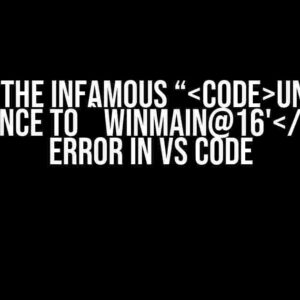Are you tired of encountering the frustrating error message “std::optional is not available though I’m using G++9” while trying to compile your C++ code? You’re not alone! Many developers have stumbled upon this enigmatic issue, only to find themselves lost in a sea of confusion. Fear not, dear reader, for we’re about to embark on a thrilling adventure to unravel the mysteries behind this error and provide you with a clear, step-by-step guide to resolve it once and for all.
What is std::optional, and Why Do I Need It?
Before we dive into the solution, let’s take a brief detour to understand what std::optional is and why it’s essential in modern C++ programming.
std::optional is a type of utility class introduced in C++17, which allows you to represent a value that may or may not be present. Think of it as a container that can hold a value, but also explicitly indicate when no value is available. This concept is particularly useful when working with functions that may or may not return a valid result, such as database queries or network requests.
By using std::optional, you can write more expressive, robust, and error-free code. It’s an essential tool in every C++ developer’s toolkit, and its absence can lead to frustrating compilation errors.
The Culprits Behind the Error
Now that we’ve established the importance of std::optional, let’s identify the primary culprits behind the “std::optional is not available though I’m using G++9” error:
- Incorrect compiler version or configuration: Although you might be using G++9, it’s possible that the compiler is not configured to support C++17 or later. This can happen due to legacy project settings, incorrect compiler flags, or even a mismatch between the compiler and standard library versions.
- Inadequate standard library support: The standard library that comes with your compiler might not include the necessary headers or implementation for std::optional. This can be due to an outdated standard library or an incomplete installation.
- Compiler flags and options: Failing to specify the correct compiler flags or options can prevent the compiler from recognizing std::optional. This might be due to incorrect command-line arguments, mismatched compiler versions, or incorrect project settings.
Solution: Confidently Conquering the Error
Now that we’ve identified the culprits, it’s time to take action! Follow these steps to resolve the “std::optional is not available though I’m using G++9” error:
Step 1: Verify Your Compiler Version and Configuration
Ensure you’re using a compatible compiler version that supports C++17 or later. You can check your compiler version using the following command:
g++ -vThis should display the version of your GCC compiler. Make sure it’s at least version 9, which includes support for C++17.
Step 2: Check Your Standard Library Support
Verify that your standard library is up-to-date and includes the necessary headers for std::optional. You can do this by:
- Checking your standard library version using the following command:
g++ -E -x c++ - -v 2>&1 | grep '#include <' | sort | uniqStep 3: Specify the Correct Compiler Flags and Options
Update your compiler flags and options to ensure that the compiler recognizes std::optional. You can do this by:
- Adding the `-std=c++17` or `-std=c++2a` flag to your compiler command:
g++ -std=c++17 -c your_file.cpp -o your_file.oStep 4: Verify Your Code and Compilation Process
Review your code to ensure that you’re using std::optional correctly. Make sure to:
- Include the `
` header at the top of your file:
#include <optional>std::optional<int> maybeValue = 42;Recompile your code using the updated compiler flags and options. If you’ve followed these steps correctly, the “std::optional is not available though I’m using G++9” error should now be resolved.
Troubleshooting and Advanced Topics
In some cases, you might encounter additional issues or require more advanced solutions. Here are some troubleshooting tips and advanced topics to consider:
Troubleshooting Tips
If you’re still encountering issues, try:
- Updating your compiler and standard library to the latest versions.
- Verifying that your project settings or makefile are correctly configured.
- Checking for any conflicting compiler flags or options.
Advanced Topics
If you’re interested in exploring more advanced topics related to std::optional, consider:
- Learning about the nuances of std::optional, such as value categories and rvalue references.
- Exploring the differences between std::optional and other related utility classes, like std::variant.
- Delving into the world of C++20 and its upcoming features, like std::expected.
Conclusion: Mastering std::optional and Beyond
In conclusion, the “std::optional is not available though I’m using G++9” error is a solvable mystery that can be conquered with a clear understanding of the underlying causes and a systematic approach to resolving the issue. By following the steps outlined in this article, you should be able to confidently use std::optional in your C++ projects.
Remember, mastering std::optional is just the beginning of your C++ journey. Continue to explore the vast landscape of modern C++ features, and soon you’ll be coding like a pro!
| Compiler Version | std::optional Support |
|---|---|
| GCC 7 | No |
| GCC 8 | Partial (C++14) |
| GCC 9 | Yes (C++17) |
| GCC 10 | Yes (C++20) |
Happy coding, and don’t let the mysteries of std::optional hold you back!
Frequently Asked Question
Get ready to unravel the mysteries of std::optional and G++9!
Q: I’m using G++9, but std::optional is not available. What’s going on?
A: Don’t panic! You might need to enable C++17 or later with the -std=c++17 flag when compiling. std::optional was introduced in C++17, so you need to tell the compiler to use this standard or later.
Q: I’ve enabled C++17, but I still get an error. What am I missing?
A: Double-check that you’ve included the
Q: Okay, I’ve got the flag and the header. But what if I’m still stuck on an older version of GCC?
A: If you’re stuck on an older version of GCC, you can use the boost::optional library as a fallback. It provides similar functionality to std::optional. Just include the
Q: Can I use std::optional with pointers?
A: Yes, you can use std::optional with pointers. However, keep in mind that it will store a nullptr if the optional is empty, rather than a default-constructed value. This can be useful, but be careful not to dereference a nullptr!
Q: How do I check if an std::optional contains a value?
A: You can use the has_value() method to check if an std::optional contains a value. Alternatively, you can use the bool conversion, e.g., if (myOptional) { … }, to check if the optional is engaged.




